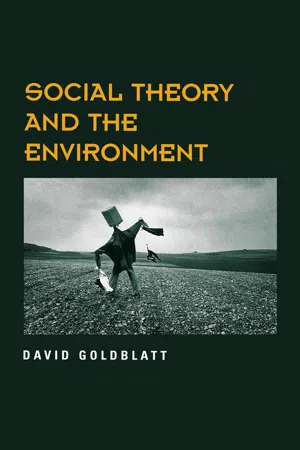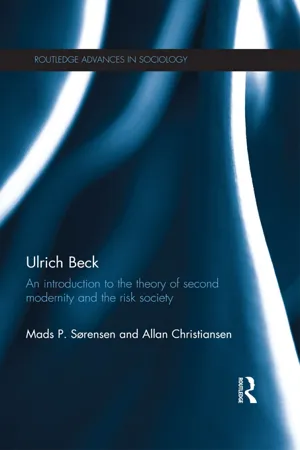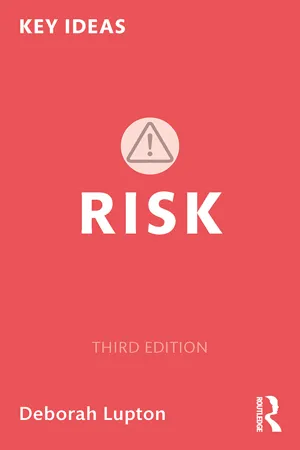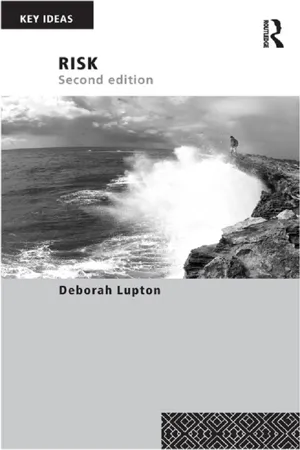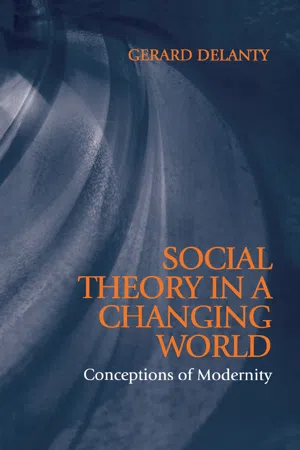Social Sciences
Ulrich Beck
Ulrich Beck was a prominent sociologist known for his work on risk society and the concept of reflexive modernization. He argued that contemporary society is characterized by new types of risks and uncertainties, and that individuals and institutions must adapt to these challenges. Beck's ideas have had a significant impact on the study of globalization, environmental issues, and social theory.
Written by Perlego with AI-assistance
Related key terms
1 of 5
12 Key excerpts on "Ulrich Beck"
- eBook - ePub
- David Goldblatt(Author)
- 2013(Publication Date)
- Polity(Publisher)
The Sociology of Risk: Ulrich BeckIntroduction: Ulrich Beck and the Risk Society
One of the most interesting and certainly one of the most idiosyncratic texts written by any social theorist in the last decade has been Ulrich Beck’s Risikogesellschaft , translated as Risk Society: Towards a New Modernity. 1 It is distinguished by two remarkable features. First and foremost, it has sold an enormous number of copies in a relatively short space of time.2 Second, it is funny. Risk Society and his more recent publications, Ecological Politics in an Age of Risk , Reflexive Modernization and The Normal Chaos of Love , are books of monstrous metaphors, testing and probing social conundrums and facing them with a black wit.3 They are not so much rigorous, analytical accounts of modernity as surveys of the institutional bases of the fears and paradoxes of modern societies – societies that no longer correspond to the classical sociological descriptions or possess cultural resources that allow them to live comfortably with the world.Beck may be funny, but he is not happy. ‘The overwhelming feature of the age is not physical … but social: the fundamental and scandalous way in which the institutions, almost without exception, fail it.’4 It is enough to make anyone angry. What can you do? How can you ride the juggernaut? If modernity is a runaway train, what can the passengers do? Beck cuts things three ways. You can look on the bright side of things. The train will stop. If it doesn’t, why worry, the tracks go on for ever. ‘One must love a tyrant one cannot overthrow or vote out of office.’5 Though most of the time you pragmatically assume that the train is not running and it does not matter where it is going or how. In any case, what can you do – nothing. Or, you keep the tracks in focus and assume the worst. Pessimists ‘feel the lack of what hardly anyone will admit to missing: braking devices, steering systems … They are the ones whose sad, furious, ludicrous gestures at least still remind the travelers of the lack of these elementary requirements.’6 Risk Society and Ecological Politics - eBook - PDF
- Anthony Elliott, Bryan S Turner, Anthony Elliott, Bryan S Turner(Authors)
- 2001(Publication Date)
- SAGE Publications Ltd(Publisher)
27 Ulrich Beck NICK STEVENSON The same loneliness that closes us opens us again. (Anne Michaels) BIOGRAPHICAL DETAILS AND THEORETICAL CONTEXT U lrich Beck was born in Pomern (which was to become a part of the German Republic in 1944) although he grew up in Hanover in what was then West Germany. He began his academic career in Munich, eventually becoming a sociology professor in the mid-1980s in the small provincial town of Bamberg. Beck is currently Professor of Sociology at the University of Munich and the British Journal of Sociology Professor at the London School of Economics and Political Science. Pre-viously, Beck served on the Future Commission for the German Government (1995±7), received an honorary degree in social science from Jyvaskyla University, and was Distinguished Research Professor at the University of Cardiff (1995±8). He is also a fellow of several scienti®c institutions, including the Institute for Advanced Study in Berlin (1990±1). The growing literature on notions of risk and society within the sociological canon is largely due to the profound in¯u-ence of Ulrich Beck. The publication in the former West Germany of his book Risk Society; Towards a New Modernity in 1986 quickly became a best-selling work. Its appearance in the wake of the nuclear accident at Chernobyl brought Beck to national, and now to international, pro-minence amongst sociologists as well as political activists and lay communities. This all too rare event in social theory gives us an initial clue as to Beck's parti-cular genius. What Beck did that was so exciting was to take a seeming discon-nected set of social phenomena including the ecological crisis, AIDs, feminism, the development of the media of mass com-munication, consumerism, the ethic of self-development and the decline of overt forms of class antagonism in the context of welfare democracies and bring them under the umbrella of the `risk society'. In the space between varieties of Marxism that predicted new phases of - eBook - ePub
Ulrich Beck
An Introduction to the Theory of Second Modernity and the Risk Society
- Mads Sørensen, Allan Christiansen(Authors)
- 2012(Publication Date)
- Routledge(Publisher)
8Critique of Ulrich Beck’s sociology
As we have shown in the previous chapters, Ulrich Beck has had a great deal of influence on the theoretical developments and agendas of international sociology for some years now. His theories have received an otherwise rare amount of attention, both from sociological circles as well as from the broader public. Beck, according to Gabe Mythen (2005a), has even come to be called one of the most influential and important sociologists of his time. It is obvious, says Mythen (2007), that Beck has helped introduce a new sociological agenda. Mythen points out that there have been a number of positive readings of Beck which have tended to focus on the socially progressive dimensions of his thesis of the risk society; he mentions as examples Bronner, who has called Risk Society a work of great analytic and epistemological potential, and McGuigan, who has called it one of the main works in the history of social theory (Mythen, 2007; Bronner, 1995; McGuigan, 1999: 125). Mythen even believes that Beck’s thought has set a new agenda, as other theoreticians such as Eder, Giddens and Strydom in some of their work build on Beck’s theory as a sort of starting point, and thereby have formed a kind of ‘risk society school’ within sociology (Mythen, 2007: 795; Giddens, 1998; Strydom, 2002). Much in the same vein, William Outhwaite says that Beck, along with Bauman, Bourdieu and Giddens, has achieved ‘canonical’ status in contemporary British sociology (Outhwaite, 2009) – a status which we would venture extends to many other parts of the world as well.According to Outhwaite, Beck’s sociology must be understood as a kind of ‘grand theory’ or a ‘diagnosis of the times’ (Outhwaite, 2009). Being a grand theory and diagnosis, Beck’s sociology is bound to cover a broad array of specific topics and subjects, in its attempt to produce a collected description of the new societal reality which Beck believes has arrived. Because of this, scholars from a wide number of different scientific disciplines have been able to use and adopt parts of his theory of second modernity as inspiration or starting points for their own studies – or they have been able to use his theory about the transition into risk society and second modernity as a framework for their own further studies. As Gabe Mythen has pointed out, scientific disciplines as different as sociology, political science, cultural studies, geography and environmental studies have been able to find inspiration in Beck’s thought. His theory of the risk society has been used as a starting point for studies of everything from international trades of global futures to questions of the transformation of war, childhood as a social construct and the disappearance of youth labour, and the life conditions of professional freelancer workers (Mythen, 2005a: 129–130; 2004: 6–7, 31; Heng, 2006). - 4
Risk and reflexive modernization
DOI: 10.4324/9781003316299-4As I observed in Chapter 2 , social theorists and researchers engaging with the ‘risk society’ perspective are primarily interested in the ways in which the concept of risk is related to the conditions of late modernity. They offer an approach that considers the politics and macro-structures of the current meanings and strategies of risk. ‘Risk society’ scholars focus on such processes as individualization, reflexivity and globalization as converging in the ‘risk societies’ of Western nations. This chapter examines the insights offered by the major exponents of the ‘risk society’ thesis, Ulrich Beck, as well as Anthony Giddens, who adopted a similar perspective. Although they initially developed their diagnoses of risk and late modernity largely separately of each other, the writings of Beck and Giddens have much in common: hence the decision to consider them together in this chapter. However, as I note at the end of the chapter, there are also some major differences in their scholarship which require acknowledgment.Beck and the ‘risk society’
The German sociologist Ulrich Beck (b. 1944, d. 2015) became a prominent figure in the sociological literature on risk in the 1990s. His book Risk Society: Towards a New Modernity was first published in English translation in 1992 (the original German version appeared six years previously) and sparked much debate about the nature of risk in contemporary Western societies. Since then, Beck has followed up this book with others on aspects on risk, many of which are available in English. These works include Reflexive Modernization (1994, written with Anthony Giddens and Scott Lash), The Normal Chaos of Love (1995, written with ElisabethBeck-Gernsheim), Ecological Politics in the Age of Risk(1995), World Risk Society (1999),The Cosmopolitan Vision (2006)andWorld at Risk - 4 Risk and Reflexive ModernizationAs I observed in Chapter 2 , the exponents of the ‘risk society’ perspective are primarily interested in the ways in which the concept of risk is related to the conditions of late modernity. This perspective offers an approach that considers the politics and macro-level of the current meanings and strategies of risk. ‘Risk society’ exponents focus on such processes as individualization, reflexivity and globalization as converging in the ‘risk society’ of Western nations. This chapter examines the insights offered by the two major exponents of the ‘risk society’ thesis: Ulrich Beck and Anthony Giddens. Although they initially developed their diagnoses of risk and late modernity largely separately of each other, the writings of Beck and Giddens have much in common: hence the decision to consider them together in this chapter. However, as I note at the end of the chapter, there are also some major differences in their writings which require acknowledgment.
Beck and the ‘Risk Society’
The German sociologist Ulrich Beck has become a prominent figure in the sociological literature on risk. His book Risk Society: Towards a New Modernity was first published in English translation in 1992 (the original German version appeared six years previously) and sparked much debate about the nature of risk in contemporary Western societies. Since then, Beck followed up this book with others on aspects on risk, many of which are available in English. These works include Reflexive Modernization (1994, written with Anthony Giddens and Scott Lash), The Normal Chaos of Love (1995, written with Elisabeth Beck-Gernsheim), Ecological Politics in the Age of Risk (1995), World Risk Society (1999), The Cosmopolitan Vision (2006) and World at Risk - eBook - PDF
- Philip Sutton(Author)
- 2017(Publication Date)
- Red Globe Press(Publisher)
Strydom (2002: 1) leans towards the critical position, arguing that, ‘A new society is emerging that will in all probability come into its own during the next three to four decades.’ Leaving 116 Nature, Environment and Society aside the portentous tone of this statement, which has been made in very similar language in most of the disjunctive theories listed above, the new society will be above all else, a risk society, and if so then its foremost interpreter will be Ulrich Beck. Because I am primarily concerned with what the risk thesis can add to our understanding of environmentalism, this chapter will centre on Beck’s influential work, drawing on related theories and evidence where necessary. Ulrich Beck’s risk society thesis Since the translation of Ulrich Beck’s Risikogesselschaft (1986) into English in 1992 as, Risk Society: Towards a New Modernity , the concept of ‘risk’ has become central to many sociological studies of environmental issues and politics. However, it should also be recognised that risk discourse is wider than this, taking in many other fields and that risk has become a flexible concept that, depending on context, refers to real world risks, perceptions of riskiness or ways of dealing with hazards. The spread of the discourse of risk in this way, arguably lends substance to Beck’s general thesis that we are moving towards a ‘risk society’, a society increasingly concerned with risks. However, this chapter investigates the contours of the risk society only from the standpoint of its relevance to an understanding of environmentalism. In doing so it is also necessary to examine Anthony Giddens’s recent work which treads a similar, though not identical, path to Beck (see O’Brien etal . 1999). - eBook - ePub
Social Theory in a Changing World
Conceptions of Modernity
- Gerard Delanty(Author)
- 2013(Publication Date)
- Polity(Publisher)
In this chapter I shall be arguing that reflexivity must be seen as mediated by culture, which has a certain autonomy with respect to agency and culture. Social change must not be seen merely in terms of a duality of structure and agency but is also culturally mediated. I shall first outline Beck’s theory of the risk society; I shall then discuss Giddens’s social theory; finally, I shall discuss some criticisms of their approaches. The position I shall argue for is that Giddens’s social theory represents an advancement on Beck’s, but it suffers from a failure to appreciate the implications of discursivity as a mediation of the personal and the institutional – agency and structure, domains that are never adequately mediated in Giddens’s theorization.Beck and the Risk Society
Few sociological works have become more influential than Ulrich Beck’s Risk Society (1992a; henceforth all references in this section are to Beck unless otherwise stated). Since its publication in 1986 in Germany, it has become one of the best-known sociological works in recent decades. The public interest in this work is not unconnected to the time of its publication, a year after the Chernobyl catastrophe.1 For many people, Beck offered an accessible sociological explanation of ecological catastrophe and in the subsequent decade his vision of a ‘new modernity’ articulated around notions of reflexivity and risk gave expression to the political context of the post-Cold War era. In this section I begin with an outline of Beck’s theory of the risk society, which is followed by a discussion of his notion of reflexivity and its implications for politics and social change. I conclude with an analysis of the tension between constructivism and realism in his work.Risk and modernity
One of the central contentions underlying Beck’s social theory is the shift from industrial society to the risk society. In this shift, a new modernity arises: ‘Just as modernization dissolved the structure of feudal society in the nineteenth century and produced the industrial society, modernization today is dissolving industrial society and another modernity is coming into being’ (1992a, p. 10). Beck, like Touraine, Melucci, Habermas and Giddens, prefers the idea of a re-interpretation of modernity to the nihilism of postmodernity, the retreat to community in communitarian political philosophy and the instrumentalization of modernity in liberalism. The idea of reflexive modernization is a ‘second modernity’, a thematization of what Beck also calls ‘premodernity’ and is not the end but the beginning of modernity. - eBook - PDF
The Risk Society Revisited
Social Theory and Risk Governance
- Eugene Rosa, Aaron McCright, Ortwin Renn(Authors)
- 2013(Publication Date)
- Temple University Press(Publisher)
While Beck (1995) acknowledges that this prac-tice occurred in earlier industrial society, he argues that it morphs into a sig-nature feature of the risk society, whereby scientists (and science itself) find themselves both the means and the ends of political debate. For Beck (1992c), this is a positive development, as it serves to increase the autonomy of other institutions and laypeople vis-à-vis science, and it makes reality more intelligi-ble to non-scientists. This Janus-like role for science—as both creator and assessor of risk—is where the fundamental structural dislocation lies for Beck. When science is no longer privileged (let alone operating as a unified whole), individuals in risk societies are left to muddle through among competing epistemologies—differ-ent ways to understand the increased risks that define those societies. In this way, the main line of conflict shifts from relations of production (in the Marx-ist sense) in modern industrial society to relations of definition in the risk soci-ety. By relations of definition, Beck (1999: 149–150) means the standards, rules, and capacities that facilitate the identification and assessment of risks. Among these are the standards of proof, burden of proof, and standards of compensa-tion. In the risk society, producers and bearers of risk conflict with each other (and debate among themselves) over relations of definition that are largely unchanged from modern industrial society, which are inadequate for the risk society (Beck 1995). Reflexive Modernization Theory and Risk 79 Relations of definition become exposed and politicized with each new catastrophe that reminds us of the risk society and as the logic of risk permeates our experience (Beck 2009b). - eBook - ePub
- Pip Jones, Liz Bradbury, Shaun LeBoutillier(Authors)
- 2015(Publication Date)
- Polity(Publisher)
manufactured risk. External risk ‘is risk experienced as coming from the outside, from the fixities of tradition or nature’, whereas manufactured risk is ‘risk created by the very impact of our developing knowledge upon the world’ (Giddens 1999: 26). In essence, as Giddens explains, it is the difference between worrying about what nature can do to us – in the form of floods and famine, for example – and worrying about what we have done to nature, for example, the emergence of threats to the environment such as global warming. He argues that the emergence of manufactured risk is one of the hallmarks of late modernity. However, Giddens does not see risk in contemporary life as being solely a matter of the potential for global catastrophes such as nuclear accidents or wars, important though this is to his analysis. He also characterizes our personal lives as suffused with risk too.In traditional worlds, whether they were based on agricultural or industrial production, to a large extent people did not have to work out how to live or who to be in the way we have to now. This is what living ‘traditionally’ means – having the assurance that things in the future will be substantially the same as they were in the past. Living in late modernity, says Giddens, means that we cannot depend on continuity and stability in this way and, as a result, we have to accommodate change and uncertainty by creating and recreating our lives on a routine basis – an activity he calls reflexivity. We will look at this characterization of late modern personal existence in more detail shortly.Ulrich Beck: a risk society
The centrality of the notion of risk in Giddens’ account of contemporary existence echoes many of the ideas of the German sociologist Ulrich Beck (1944–). Like Giddens, Beck rejects postmodernism. He acknowledges the new circumstances in which our lives are lived today, but prefers to call this emerging world a ‘new modernity’, rather than describe it as postmodern. Again like Giddens, Beck analyses contemporary life at the levels of both structure and action, and lays much of the blame for the increase in manufactured risk at both levels on natural science. As he puts it: ‘Science has become the protector of a global contamination of people and nature. In that respect, it is no exaggeration to say that in the way they deal with risks in many areas, the sciences have squandered until further notice their historic reputation for rationality’ (Beck 1992: 70).One of Beck’s key points concerns the way our relationship to science and scientists has changed in recent years. In the past, we took it for granted not only that science could be relied on to tell us the truth, but also that scientists were experts we could depend upon to guide us in circumstances of uncertainty. It was a case of ‘Trust us, we’re scientists’, as much as ‘Trust me, I’m a doctor.’ As Giddens puts it: - eBook - PDF
Culture and Identity
Critical Theories
- Ross Abbinnett(Author)
- 2003(Publication Date)
- SAGE Publications Ltd(Publisher)
Rather, we must consider the consequences of living within a technological civilization which, at any time, could bring about its own destruction. It is this profound sense of insecurity which is taken up in Anthony Giddens' sociology of risk. For while he accepts the general account of civilization risks which is given in Risk Society, his own work attempts to show how it is possible for the awareness of impending catastrophe to coexist with a sense of social solidarity. For Giddens, the engagement of reflexive individuals with technologically determined risks, is mediated through an implicit sense of trust in the expert systems on which they depend. Indeed, he suggests that it is only within the relative security of the normative expectations that he calls the Umwelt that it is possible for social agents to be reflexive about the ethical and political responsibilities of late modern-ity. I will look more closely at Giddens' understanding of the relationship between risk, security and identity in a moment. For now, however, I need to give a more detailed account of Beck's Risk Society. At the beginning of his book, Beck argues that as the industrial revolution increased the productivity of Western capitalist societies, the relationship between scientific knowledge, technical innovation and econ-omic demand became increasingly close. Under the conditions of 'primary industrialization', in other words, the economy became the principal determinant of scientific research. For unless a particular area of theoretical knowledge was seen to offer the possibility of technical innovation in the production of commodities (that is, to increase the rate at which surplus value could be produced in a particular productive enterprise), it was likely to remain relatively impoverished and undeveloped. - eBook - PDF
- Nicholas Gane(Author)
- 2004(Publication Date)
- Continuum(Publisher)
REFERENCES Bauman, Z. (1989) Modernity and the Holocaust. Cambridge: Polity. Beck, U. (1992) Risk Society. London: Sage. Beck, U. (1997) The Reinvention of Politics. Cambridge: Polity. Beck, U. (1999) World Risk Society. Cambridge: Polity. Beck, U. (2000a) What is Globalization? Cambridge: Polity. Beck, U. (2000b) 'The Cosmopolitan Perspective', British Journal of Sociology., Vol. 51, No. l,pp. 79-105. Beck, U. (2002a) Macht und Gegenmacht im globalen Zeitalter. Frankfurt: Suhrkamp. Beck, U. (2002b) 'The Cosmopolitan Society and Its Enemies', Theory, Culture & Society, Vol. 19, Nos 1-2, pp. 17-44. Beck, U., Giddens, A. and Lash, S. (1994) Reflexive Modernization. Cam-bridge: Polity. Kaufman, J.-C. (1999) Sociologie du couple. Paris: PUF. - eBook - ePub
The Risk Society and Beyond
Critical Issues for Social Theory
- Barbara Adam, Ulrich Beck, Joost Van Loon, Barbara Adam, Ulrich Beck, Joost Van Loon(Authors)
- 2000(Publication Date)
- SAGE Publications Ltd(Publisher)
12
Risk Society Revisited: Theory, Politics and Research Programmes
Ulrich Beck
Living in an age of constructivism, the attempt to draw a line between modernity (or as I would prefer to say first industrial modernity) and world risk society (or second reflexive modernity) seems to be naive or even contradictory. Within a constructivist framework no one is able to define or declare what really ‘is’ or ‘is not’. Yet, this does not square with my experience. I cannot understand how anyone can make use of the frameworks of reference developed in the eighteenth and nineteenth centuries in order to understand the transformation into the post-traditional cosmopolitan world we live in today. Max Weber’s ‘iron cage’ - in which he thought humanity was condemned to live for the foreseeable future - is to me a prison of categories and basic assumptions of classical social, cultural and political sciences. It is the case that we have to free ourselves from these categories in order to find out about the unknown post-Cold-War-world. Do not get me wrong. I do not consider most of the philosophies and theories (sociologies) of so-called postmodernity to fare any better since they cannot answer very basic questions about how and in what ways everyday lives and professional fields are being transformed. Conventional social sciences, I therefore want to argue, even if they are conducting highly sophisticated theoretical and empirical research programmes, are caught up in a circular argument. By using the old categories (like class, family, gender roles, industry, technology, science, nation state and so on) they take for granted what they actually try to demonstrate: that we still live, act and die in the normal world of nation-state modernity.Some of the discussions in this volume, which accuse me of being a ‘realist’, therefore, are the result of a misinterpretation of my arguments. What strikes me about them is the inability of constructivist thinking to criticize and renew the frameworks of modern and post-modern sociology. Let me explain. I consider realism and constructivism to be neither an either-or option nor a mere matter of belief. We should not have to swear allegiance to any particular view or theoretical perspective. The decision whether to take a realist or a constructivist approach is for me a rather pragmatic one, a matter of choosing the appropriate means for a desired goal. If I have to be a realist (for the moment) in order to open up the social sciences to the new and contradictory experiences of the global. age of global risks, then I have no qualms to adopt the guise and language of a (‘reflexive’) ‘realist’. If constructivism makes a positive problem shift possible and if it allows us to raise important questions that realists do not ask, then I am content (for that moment at least) to be a constructivist. Having grown up with the constructivist philosophies of thinkers such as Kant, Fichte and Hegel, I find today, especially in the area of sociology of risk, that I do not restrict my analysis to one perspective or conceptual dogma: I am both a realist and constructivist, using realism and
Index pages curate the most relevant extracts from our library of academic textbooks. They’ve been created using an in-house natural language model (NLM), each adding context and meaning to key research topics.
